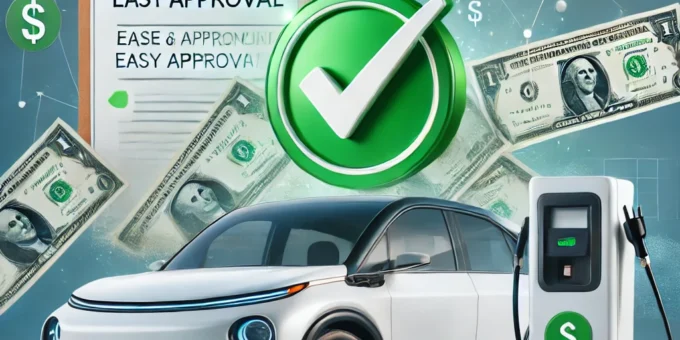
Switching to an electric vehicle (EV) is an exciting step towards sustainable driving and lower fuel costs. However, the upfront cost of an EV can be a hurdle for many buyers. Fortunately, EV financing options make it easier than ever to own an electric car without breaking the bank.
From low-interest auto loans to green financing programs, this guide explores the best ways to finance your EV, ensuring you get the best deal possible.
Why Consider EV Financing?
Lower Upfront Costs
EVs can be expensive, with prices ranging from $30,000 to over $100,000. Financing allows you to spread the cost over time, making ownership more affordable.
Access to Low-Interest Green Loans
Many banks and credit unions offer special interest rates on loans for electric and hybrid vehicles. These “green loans” often come with discounts or longer repayment terms.
Government Incentives & Rebates
The U.S. government and several states offer EV tax credits, rebates, and reduced registration fees that can offset financing costs and make EVs more budget-friendly.
Improved Fuel & Maintenance Savings
With zero gas expenses and lower maintenance costs, your monthly budget benefits from significant long-term savings.
Best EV Financing Options
1. Green Auto Loans
Green auto loans are designed specifically for eco-friendly vehicles, including electric cars. These loans offer lower interest rates and better terms than traditional auto loans.
Best Green Auto Loan Providers:
| Lender | APR (Annual Percentage Rate) | Loan Terms | Benefits |
|---|---|---|---|
| LightStream | 5.99% – 9.99% | 24 – 84 months | No vehicle restrictions |
| Bank of America | 4.99% – 8.99% | 36 – 72 months | Preferred rates for EVs |
| Federal Credit Unions | 3.99% – 7.49% | 36 – 84 months | Minimal fees, flexible terms |
💡 Tip: Many lenders offer a 0.25% discount if you set up autopay or go paperless!
2. EV Manufacturer Financing Deals
Many EV brands provide special financing promotions for new buyers, such as low-interest rates, cashback incentives, or lease options.
Top EV Manufacturer Financing Options:
| Manufacturer | APR Offer | Loan Term | Additional Incentives |
|---|---|---|---|
| Tesla | 3.99% APR | Up to 72 months | $7,500 tax credit on Model 3/Y |
| Nissan | 0% APR for 36 months | 24 – 72 months | Lease deals on the Leaf |
| Ford | 1.9% APR | 36 – 60 months | Cash discounts on Mustang Mach-E |
🚗 Pro Tip: Dealer financing often includes rebates or subsidized interest rates, making it worth comparing with bank or credit union loans!
3. Credit Union Loans – Lower Rates & Flexible Terms
Credit unions tend to offer lower rates than traditional banks and have EV-specific loan programs.
Best Credit Unions for EV Loans:
| Credit Union | Interest Rate | Loan Terms | Key Perks |
|---|---|---|---|
| Navy Federal | 3.49% APR | 36 – 84 months | No application fees |
| PenFed | 2.99% APR | Up to 96 months | Green vehicle discounts |
| Alliant | 3.74% APR | 36 – 84 months | Cashback rewards |
🏦 Tip: Even if you’re not a credit union member, joining is easy and often requires just a small deposit.
4. Federal & State EV Incentives
The U.S. federal tax credit can reduce your EV cost by up to $7,500. Many states also offer rebates, sales tax exemptions, and other perks.
Top State EV Incentives:
| State | Rebate Amount | Eligibility |
|---|---|---|
| California | Up to $7,500 | Extra rebates for low-income buyers |
| New York | $2,000 | EVs under $60,000 |
| Colorado | $5,000 | Applies to new and leased EVs |
🔋 Tip: Check with your local power company—many offer rebates for home EV chargers!
5. Lease vs. Buy: What’s the Best EV Financing Option?
Leasing an EV allows you to drive a new model every few years while financing gives you full ownership.
Pros & Cons of Leasing vs. Financing an EV:
| Factor | Leasing | Financing |
|---|---|---|
| Monthly Payment | Lower | Higher |
| Ownership | No | Yes |
| Mileage Limits | Yes | No |
| Upgrade Options | Every 2-3 years | Must sell/trade-in |
⚡ Best for frequent upgraders: Leasing lets you switch to newer EV models every few years!